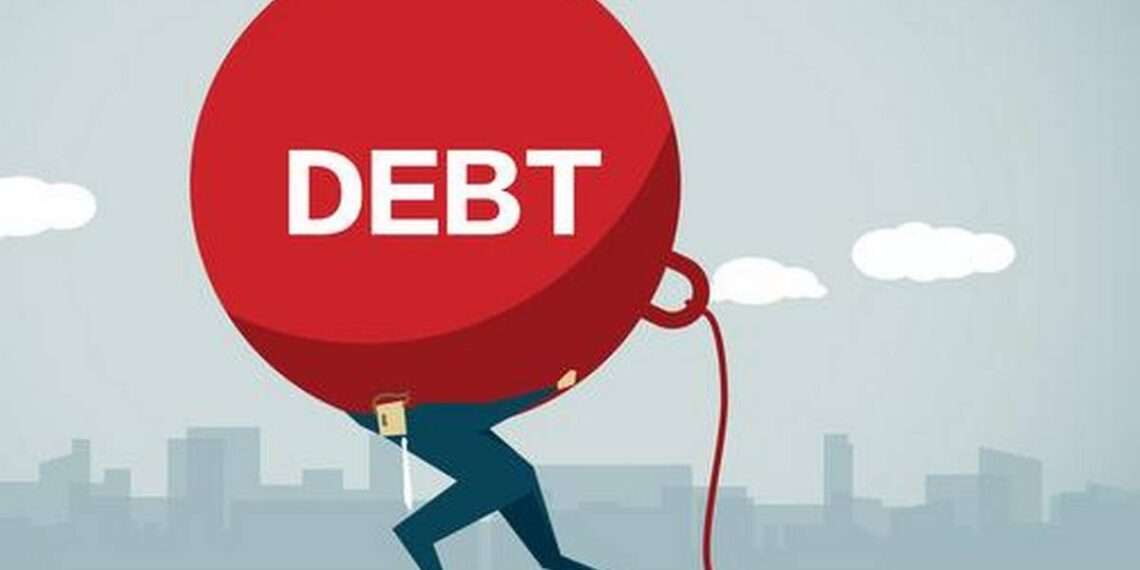Ghana’s total public debt stock witnessed a notable decline in December 2024, falling to GH¢726.7 billion, according to the latest data from the Bank of Ghana (BoG).
This represents a GH¢15.8 billion reduction from the GH¢742.5 billion recorded in November 2024. Despite this improvement in cedi terms, the total debt stock in dollar terms increased slightly to US$49.4 billion in December 2024, compared to US$48.3 billion in the previous month.
The decline in the cedi-denominated debt can be attributed to an expansion in the country’s Gross Domestic Product (GDP), which reached GH¢1.176 trillion as of December 2024.
This economic growth helped lower Ghana’s debt-to-GDP ratio to 61.8%, signifying an improvement in the country’s fiscal outlook. The expansion in GDP suggests that despite the high debt levels, the economy is growing at a pace that makes the debt burden relatively more manageable.
External Debt on the Rise
While the overall debt stock declined in cedi terms, Ghana’s external debt increased marginally, reaching US$28.3 billion in December 2024 from US$28.0 billion in November 2024. This rise was primarily driven by the depreciation of the cedi during the period, which inflated the value of external obligations when converted to local currency.
Earlier in September and October 2024, Ghana’s external debt had stood at US$32.1 billion and US$28.3 billion, respectively. The fluctuations in external debt highlight the sensitivity of Ghana’s financial position to exchange rate movements and external market conditions.
Given that a significant portion of the country’s debt is denominated in foreign currency, any sharp depreciation in the cedi could potentially increase the real cost of servicing these debts.
Domestic Debt Sees a Decline
In contrast to the rise in external debt, Ghana’s domestic debt saw a marginal decline, dropping to GH¢309.8 billion in December 2024 from GH¢311.4 billion in November 2024. This represented approximately 26.3% of GDP. The reduction in domestic debt was largely attributed to a decline in yields on government securities, indicating improved investor confidence and a more stable domestic financial environment.
Lower yields typically suggest that borrowing costs for the government have reduced, potentially easing the fiscal strain and creating room for more sustainable debt management strategies. The decline in domestic debt also reflects efforts by the government to balance its financing mix between domestic and external sources, reducing the pressure on the local financial system.
On the fiscal front, Ghana’s budget deficit stood at 5.2% of GDP in December 2024. While this figure remains above the government’s medium-term target, it reflects efforts to manage fiscal imbalances amid economic challenges. The primary balance, which excludes interest payments on debt, was recorded at a deficit of 1.2% of GDP, indicating that government revenues were still insufficient to cover non-interest expenditures.
Maintaining a sustainable fiscal deficit is crucial for Ghana’s economic stability, as excessive deficits can lead to further borrowing and an unsustainable debt burden. The government’s ability to narrow the deficit in the coming months will be key to maintaining investor confidence and ensuring fiscal sustainability.
Economic Outlook and Policy Implications
Ghana’s economic performance in December 2024 suggests a mixed outlook. While the decline in public debt in cedi terms and the GDP expansion are positive indicators, the increase in external debt due to currency depreciation remains a concern.
Moving forward, policymakers will need to focus on stabilizing the cedi, reducing borrowing costs, and improving revenue collection to sustain the momentum in debt reduction. Additionally, the government must implement structural reforms to enhance productivity, increase exports, and attract foreign direct investment to further strengthen the economy.
If the country continues on this trajectory, Ghana could achieve greater fiscal stability and improve its debt sustainability metrics, paving the way for long-term economic growth.
READ ALSO: New SEC Boss Vows to Boost Investor Confidence and Market Awareness

















